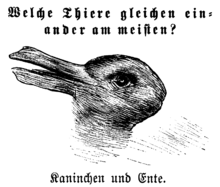Wikipedia:The fake duck test
This is an essay. It contains the advice or opinions of one or more Wikipedia contributors. This page is not an encyclopedia article, nor is it one of Wikipedia's policies or guidelines, as it has not been thoroughly vetted by the community. Some essays represent widespread norms; others only represent minority viewpoints. |
| This page in a nutshell: Exercise caution before using the duck test. |

The duck test – "If it looks like a duck, swims like a duck, and quacks like a duck, then it probably is a duck" – suggests that something can be identified by its habitual characteristics.
The duck test does not apply to non-obvious cases. Unless there is evidence which proves otherwise beyond a reasonable doubt, editors must assume good faith from others.
However, some editors often use ![]() Looks like a duck to me at the circumstance of ignoring the details, but they don't realize that those details are the key to judgment, which often leads to wrong judgments. Therefore, how to determine the fake duck (or the fake duck test) is also a very important thing for them.
Looks like a duck to me at the circumstance of ignoring the details, but they don't realize that those details are the key to judgment, which often leads to wrong judgments. Therefore, how to determine the fake duck (or the fake duck test) is also a very important thing for them.
Usage
editThe "fake duck test" is meant to be used for internal processes within Wikipedia. For example, consider that "User:Example1" is engaged in a heated dispute with someone else, and gets blocked because of it, and it used American English. Immediately after, a "User:Example2" registers on Wikipedia and continues the dispute right away, saying the same things but using Australian English. The editors often overlook the seemingly trivial crux of using American or Australian English, and misjudgment due to the duck test.
Of course, some puppet operators (especially after reading this article) may deliberately create some side-by-side differences (for example, in this case, "User:Example1" deliberately changing its speaking habits to Australian English) in an attempt to evade surveillance. Faced with this situation, the community should prudently use common sense and experience, and consider all circumstances and possibilities before making an appropriate decision.
Like the duck test, the fake duck test does not apply to article content, and does not trump, or even stand aside, policies such as no original research, verifiability, and neutral point of view. If there is an animal that "looks like a duck, swims like a duck, and quacks like a duck", but zoologists agree that it does not belong in the family Anatidae, then it is not a duck, period. (That being said, some editors believe that you don't need to cite that the sky is blue.)